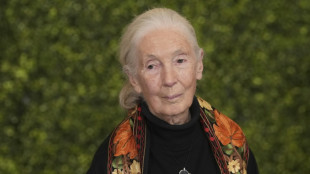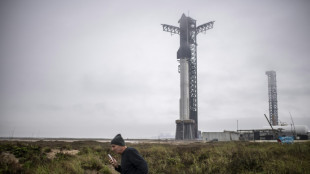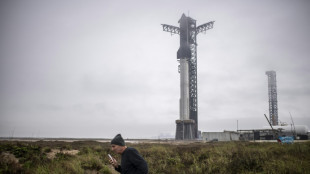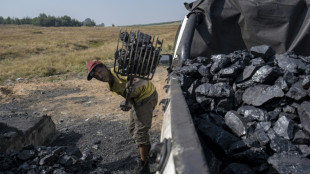
-
 Clark edges two clear at Arnold Palmer Invitational
Clark edges two clear at Arnold Palmer Invitational
-
Super cool: ATP sensation Fonseca learning to deal with demands of fame

-
 Trump again casts doubt on his commitment to NATO
Trump again casts doubt on his commitment to NATO
-
EU leaders agree defence boost as US announces new talks with Kyiv

-
 48 killed in 'most violent' Syria unrest since Assad ouster: monitor
48 killed in 'most violent' Syria unrest since Assad ouster: monitor
-
US and European stocks gyrate on tariffs and growth

-
 Deja vu on the Moon: Private US spaceship again lands awkwardly
Deja vu on the Moon: Private US spaceship again lands awkwardly
-
Brazilian teen Fonseca into Indian Wells second round

-
 Abortion access under threat in Milei's Argentina
Abortion access under threat in Milei's Argentina
-
Trump backs off Mexico, Canada tariffs after market blowback

-
 Trump car tariff pivot and Detroit's 'Big Three'
Trump car tariff pivot and Detroit's 'Big Three'
-
Man Utd draw in Spain in Europa League last 16 as Spurs beaten

-
 California's Democratic governor says trans women in sports 'unfair'
California's Democratic governor says trans women in sports 'unfair'
-
Trump says Musk should use 'scalpel' not 'hatchet' in govt cuts

-
 Goodall, Shatner to receive environmentalist awards from Sierra Club
Goodall, Shatner to receive environmentalist awards from Sierra Club
-
Dingwall glad to be 'the glue' of England's back-line against Italy

-
 Chelsea edge Copenhagen in Conference League last 16 first leg
Chelsea edge Copenhagen in Conference League last 16 first leg
-
Real Sociedad fight back to earn Man United draw in Europa League

-
 Chunky canines: Study reveals dog obesity gene shared by humans
Chunky canines: Study reveals dog obesity gene shared by humans
-
Europe rallies behind Zelensky as US announces new talks with Kyiv

-
 Drop in US border crossings goes deeper than Trump
Drop in US border crossings goes deeper than Trump
-
Guyana appeals to UN court as Venezuelan plans vote in disputed zone

-
 Private US spaceship lands near Moon's south pole in uncertain condition
Private US spaceship lands near Moon's south pole in uncertain condition
-
Saudi PIF to pay 'up to 12 months maternity leave' for tennis players

-
 16 killed in 'most violent' Syria unrest since Assad ouster: monitor
16 killed in 'most violent' Syria unrest since Assad ouster: monitor
-
Peru farmer confident ahead of German court battle with energy giant

-
 US-Hamas talks complicate Gaza truce efforts: analysts
US-Hamas talks complicate Gaza truce efforts: analysts
-
European rocket successfully carries out first commercial mission

-
 SpaceX gears up for Starship launch as Musk controversy swirls
SpaceX gears up for Starship launch as Musk controversy swirls
-
Trump backs off Mexico tariffs while Canada tensions simmer

-
 Europe's new rocket blasts off on first commercial mission
Europe's new rocket blasts off on first commercial mission
-
SpaceX gearing up for Starship launch amid Musk controversy

-
 Racked by violence, Haiti faces 'humanitarian catastrophe': MSF
Racked by violence, Haiti faces 'humanitarian catastrophe': MSF
-
Gisele Pelicot's daughter says has filed sex abuse case against father

-
 New Zealand set for 'scrap' with India on slower pitch: Santner
New Zealand set for 'scrap' with India on slower pitch: Santner
-
US signals broader tariff reprieve for Canada, Mexico as trade gap grows

-
 US to carry out first firing squad execution since 2010
US to carry out first firing squad execution since 2010
-
Roy Ayers, godfather of neo-soul, dead at 84

-
 ECB chief warns of 'risks all over' as rates cut again
ECB chief warns of 'risks all over' as rates cut again
-
Albania to shut down TikTok in coming days

-
 Pompidou museum invites public for last look before renovation
Pompidou museum invites public for last look before renovation
-
Graham returns for Scotland's Six Nations match against Wales

-
 US firm hours away from Moon landing with drill, rovers, drone
US firm hours away from Moon landing with drill, rovers, drone
-
Bosnian Serb leader rejects prosecutor summons as crisis deepens

-
 England considering Test skipper Stokes for white-ball captaincy
England considering Test skipper Stokes for white-ball captaincy
-
Neymar back for Brazil after 16-month absence for World Cup qualifiers

-
 US trade gap hits new record in January as tariff fears loomed
US trade gap hits new record in January as tariff fears loomed
-
Scandinavians boycott US goods over Trump's Ukraine U-turn

-
 South Africa, Indonesia say US withdrawing from climate finance deal
South Africa, Indonesia say US withdrawing from climate finance deal
-
ECB lowers rates again but hints more cuts in doubt


Anger, reflection as N.Ireland marks 50 years since 'Bloody Sunday'
Relatives of 13 civil rights protesters shot dead in Northern Ireland by British soldiers 50 years ago demanded justice on Sunday, as they commemorated one of the darkest days in modern UK history.
The "Bloody Sunday" victims' names were read out under a leaden sky to the mournful notes of an Irish flute, as the relatives and hundreds of supporters gathered for a memorial service in the city of Londonderry -- known as Derry to pro-Irish nationalists.
Earlier, many had retraced a peaceful march through the divided city that ended in carnage on January 30, 1972, when the protesters had set out to demand Catholic rights against the city's Protestant minority.
From U2, Bono and The Edge released on social media an acoustic version of "Sunday Bloody Sunday", the Irish band's iconic song about the day.
A performance of music and poetry hosted by actor Adrian Dunbar, from TV police drama "Line of Duty", included a choral rendition of the US civil rights anthem "We Shall Overcome" -- which was also sung by the 1972 marchers.
Michael McKinney, whose brother William was among those killed, said the UK government was "scared" of allowing any prosecutions of the soldiers for fear of what a trial might uncover.
But addressing the remembrance service, he stressed: "We will not go away and we will not be silenced. We shall overcome."
At the head of Sunday's procession were 14 children each bearing a white rose -- a 14th man who was shot died months later, although an official inquiry said his death was unrelated to his wounds.
The children were followed by older relatives carrying portraits of those killed by members of the British Army's feared Parachute Regiment.
Some of the victims were shot in the back, or while on the ground, or while waving white handkerchiefs, as more than 100 high-velocity rounds ripped across the city's Catholic Bogside district.
- Still no closure -
The yearly memorial service was attended for the first time by an Irish premier, as Taoiseach Micheal Martin joined other dignitaries in laying a wreath at an obelisk commemorating the 14.
"I believe that the full process and justice of the courts should be deployed," Martin told reporters after meeting the relatives in private.
"It is important because time is moving on too for many, many families, and families need closure."
British Prime Minister Boris Johnson this week called "Bloody Sunday" a "tragic day in our history".
But his government is pushing legislation that critics say amounts to an amnesty for all killings during Northern Ireland's three decades of sectarian unrest, including by security forces.
After an initial government report largely exonerated the paratroopers and authorities, a 12-year inquiry found in 2010 that the victims were unarmed and posed no threat, and that the soldiers' commander on the ground violated his orders.
The mammoth inquiry, whose report ran to 5,000 pages, prompted then prime minister David Cameron to issue a landmark apology in parliament.
He agreed with its finding that the killings were "unjustified and unjustifiable".
- 'Collateral damage' -
One paratrooper, "Soldier F," was charged with murder in 2019. But prosecutors dropped the case last year after determining that the evidence against him would not be permissible in a court.
Michael McKinney is seeking a judicial review of the prosecutors' decision.
Charlie Nash, now 73, saw his 19-year-old cousin William Nash killed on "Bloody Sunday".
"It's important for the rest of the world to see what they done to us that day. But will we ever see justice?" he told AFP.
"Never, especially not from Boris Johnson," Nash added.
In Northern Ireland, new tensions today surround the UK's fractious divorce from the European Union.
Protestant unionists want Johnson's government to scrap a protocol governing post-Brexit trade for the province, which treats Northern Ireland differently from the UK mainland.
"Northern Ireland finds itself again in the eye of a political storm where we appear to be collateral damage for a prime minister whose future is hanging in the balance," said professor Deirdre Heenan, a Londonderry resident who teaches social policy at Ulster University.
J.Bergmann--BTB
